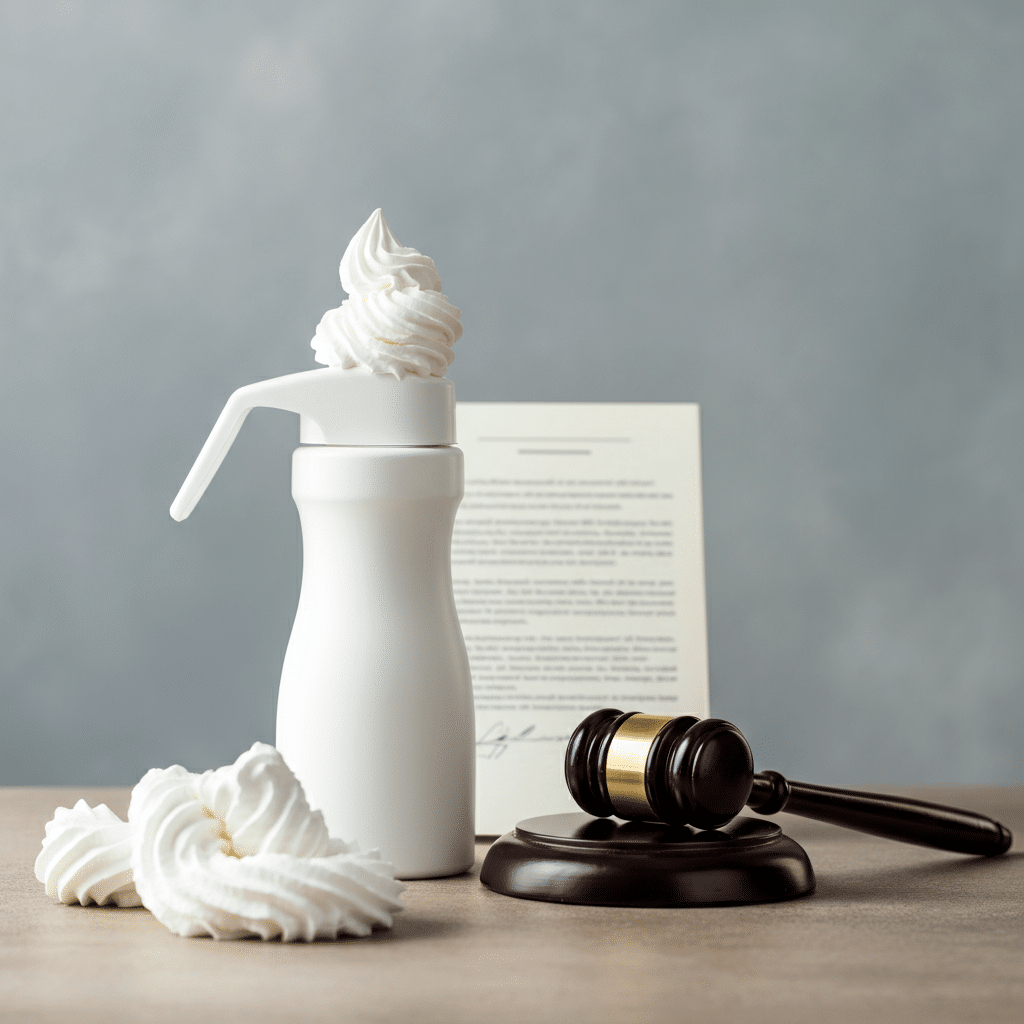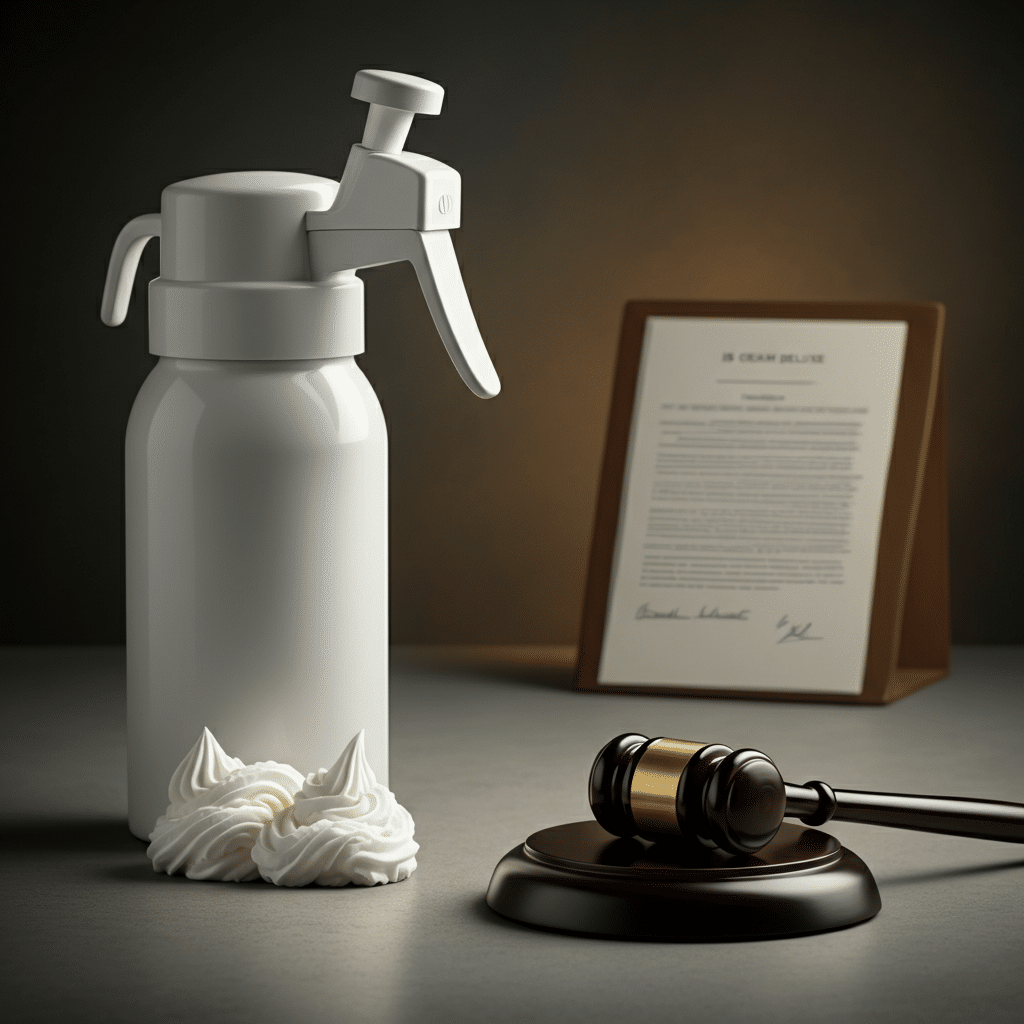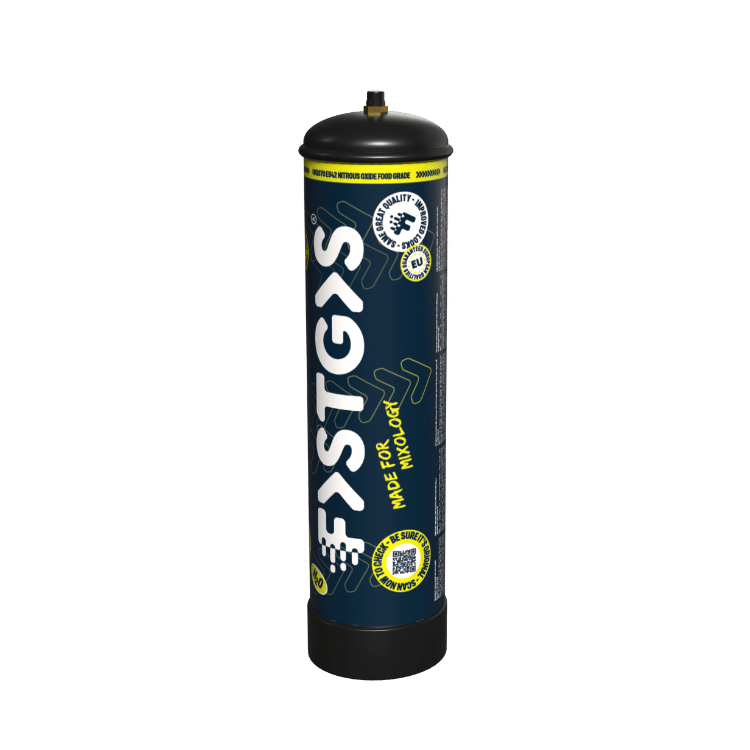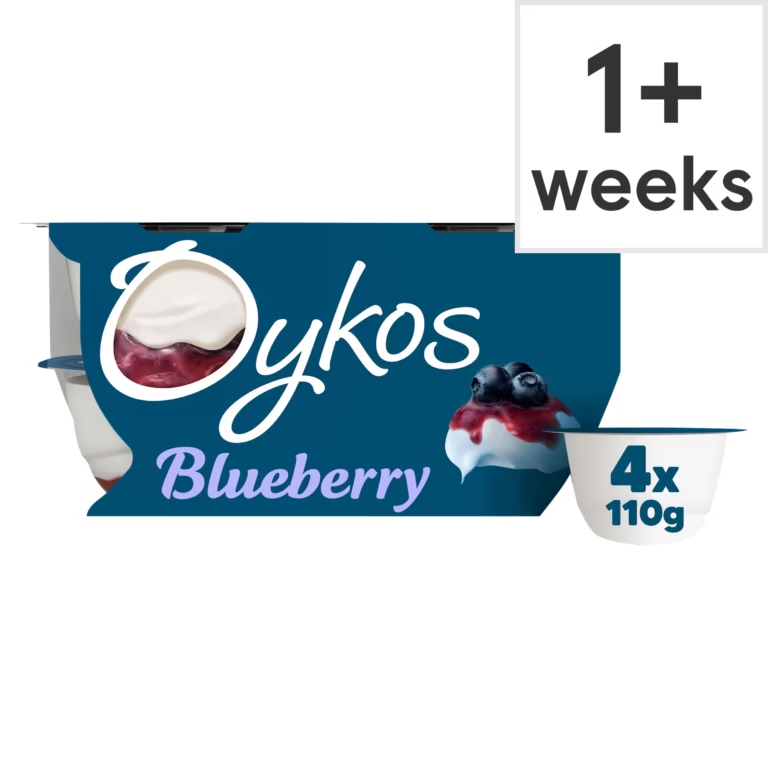Quick Answer: Is Cream Deluxe Illegal?
Yes, nitrous oxide is legal to use in culinary applications (e.g., whipped cream chargers) in many places. However, recreational misuse—such as inhaling it for a high—is illegal in most countries. Regulations vary widely by region, with some areas imposing strict rules on who can buy and use it.
Meaning of Nitrous Oxide
Nitrous oxide is a colorless, non-flammable gas with a slightly sweet odor and taste. It is made up of 2 nitrogen atoms attached to an oxygen atom, making it a basic chemical compound. Frequently referred to as “laughing gas” in medical circles, its anesthetic properties have actually been identified and used considering that the late 18th century. Past its medical applications, nitrous oxide is a popular choice in the culinary world as a propellant gas in cream dispensers, offering the “whip” in whipped cream.
Its recreational use, nonetheless, highlights its psychoactive effects, typically resulting in euphoria and giggling fits, therefore the label. In spite of these relatively safe effects, recreational use can lead to considerable health risks, consisting of vitamin B12 deficiency and nerve damage. This duality of use– varying from medical and culinary to recreational– adds to the discussions bordering its legal status and exactly how best to control its circulation and use.
Summary of Class C Drug Condition
In the context of the United Kingdom, nitrous oxide’s category under drug regulation is layered and complex. Originally, nitrous oxide was not controlled under the Misuse of Drugs Act 1971. Nevertheless, it was later considered a psychoactive substance under the Psychoactive Substances Act 2016. This category goals to suppress its recreational use due to health risks and potential for misuse.
A key facet of this category is its uniquenessto recreational use The regulation does not impact its legitimate use in medicine, dentistry, or the culinary industry, where it continues to be a legal and vitaltool The Class C standing largely intends to address issues stemming from recreational misuse, such as oxygen deprivation and nerve damage, by discouraging non-medical customers with chargesand restrictions By recognizing these guidelines, both authorities and the public can browse the legal landscape worrying nitrous oxide better. This approach makes certain critical medical and industrial usages are protected while alleviating potential injury connected with recreational misuse.
Legal Use of Nitrous Oxide in the UK
Nitrous oxide, typically referred to as laughing gas, has an authorized use in the UK, largely in culinary, medical, and industrial contexts. As a gas with numerous applications, it offers important functions in areas such asfood processing and anesthesia Particularly, it is extensively utilized in the culinary industry to create whipped cream, where it works as apropellant in cream chargers Nitrous oxide’s validity joints on its intended use; when used appropriately within regulated markets, it continues to be a legitproduct Nevertheless, its misuse for recreational purposes can cross legal boundaries, leadingto potential health and legal repercussions Recognizing its legal status entails differentiating between approved usages and unlawful behaviors that position risks to health and safety.
Culinary Applications: Cream Deluxe and Smart Whips
In the culinary world, nitrous oxide is commemorated for its function in the preparation of whipped cream, especially with products likeCream Deluxe and Smart Whips These devices are critical in developing the airy appearances found in numerousdesserts and beverages Cream Deluxe and Smart Whips use food-grade nitrous oxide to charge cream dispensers, enabling chefs and home cooks to whip cream in big or tiny sets successfully. The precision and efficiency of these tools make them crucial in professional and domestic kitchens Chef Chef-preferred, such products emphasize the legal and beneficial use of nitrous oxide within food preparation, sticking purely to safety guidelines and quality standards to avoid health risks connected with inappropriate handling or use.
Identifying Legal vs. Illegal Use Of
Separating between legal and illegal use of nitrous oxide is critical for guaranteeing compliance with regulations and preserving safety. Legal uses include its application in culinary, medical, and industrial setups where its residential properties are utilized suitably. On the other hand, illegal use usually entails its recreational application, which drops below permitted limits. Recreational inhalation of nitrous oxide, seeking its psychoactive effects, poses considerable health threats, such as oxygen deprivation and potential nerve damage. Additionally, the Possession of nitrous oxide for recreational use has legal implications under the Psychoactive Substances Act 2016, which forbids its sale for drunkenness. Recognizing these differences is important to stopping misuse and guaranteeing that nitrous oxide is utilized responsibly and legally in culture.
Health Risks Linked with Nitrous Oxide
Nitrous oxide, typically called laughing gas, is typically utilized both clinicallyand recreationally As a popular choice for whipped cream chargers or smart whips such as Cream Deluxe, it is essential to know of the potential health risks connected with itsmisuse In spite of its genuine applications in the culinary world, the inhalation of nitrous oxide can lead to numerous health issues. Uncontrolled or recreational use typically results in unplanned physical and neurological side effects that customers might not completely prepare for. With the increasing number of health issues connected to misuse, authorities and medical professionals emphasize the value of recognizing these risks.
Common Health Problems
Nitrous oxide misuse is not without its temporary and possibly dangerous health effects. When breathed in recreationally, it might cause dizziness, nausea, and migraines due to its psychoactive effects. Customers typically report a euphoric high, yet at the same time, they are at risk of oxygen deprivation, which can lead to a short-term loss of awareness. This absence of oxygen can be especially harmful, as it hampers the body’s capability to function normally and can result in severe injury if immediate action is not taken. Identifying these risks is critical for anybody thinking about exploring nitrous oxide beyond its designated uses.
Additionally, duplicated use can result in vitamin B12 deficiency, a condition that can have numerous health ramifications, such as exhaustion or extra severe neurological signs. As nitrous oxide conflicts with exactly how the body soaks up vitamin B12, the deficiency might take some time to reveal, yet can lead to extra severe health issues if left unaddressed. Those who routinely use nitrous oxide for its psychoactive properties need to know of these potential shortages and look for ideal medical guidance to alleviate these risks.
Long-term Effects: Nerve Damage
Persistent use of nitrous oxide can lead to extreme long-term health effects, one of the most worrying being nerve damage. Extended direct exposure to the gas interrupts vitamin B12 absorption, critical for preserving nerve health. When B12 levels drop dramatically, the user risks experiencing neurological issues that may initially present as prickling or tingling in the extremities. If the underlying deficiency is left without treatment, these preliminary signs might develop into even more severe nerve damage, possibly impacting motor skills and causing long-term injury.
The nerve damage stems largely from the substance’s disturbance of the body’s metabolic processes. By impeding vital functions within the nervous system, long-term misuse of nitrous oxide might result in a range of disabilities, consisting of cognitive and motor dysfunctions. Customers may experience problems in synchronization and balance, impeding their capability to execute day-to-day tasks successfully. Over time, this can significantly impact their quality of life and require considerable medical treatments.
Medical professionals and authorities proceed to stress the value of recognizing these risks, especially in stopping the rise of signs. Awareness and very early treatment remain key to resolving the nerve damage connected with nitrous oxide misuse. Motivating more secure practices and highlighting the value of sticking to legal guidelines surrounding its use is critical in decreasing these risks.
Legal Ramifications for Consumers and Retailers
The use of nitrous oxide, typically described as “laughing gas,” has actually seen a rise in appeal for bothculinary and recreational purposes Nevertheless, this has actually led to differing legal implications that influence bothconsumers and retailers As a gas typically found in whipped cream chargers, nitrous oxide is legal when utilized for its designated culinary purposes, such as in acream dispenser to create whipped cream Nevertheless, its psychoactive effects have actually elevated considerable issues. Under the Psychoactive Substances Act 2016 in the UK, its recreational use is illegal, as nitrous oxide can cause oxygen deprivation, nerve damage, and possibly, vitamin B12 deficiency, presenting considerablehealth risks Retailers need to browse a legally complex landscape to make sure compliance, while consumers need to stay educated to avoid legal repercussions and health risks connected with misuse.
Consumer Responsibilities and Awareness
Consumers have a crucial function in guaranteeing the responsible use of nitrous oxide. Awareness of the connected health risks is important. Inhaling nitrous oxide for its psychoactive effects can lead to severe safety issues, including oxygen deprivation and nerve damage. Most importantly, regular misuse might likewise result in a vitamin B12 deficiency, which is important for preserving nerve health. Consumers are prompted to work out care and limitation its use purely to culinary purposes, especially in whipping cream.
Education And Learning on legal restrictions is likewise vital. The Possession of nitrous oxide for recreational use refutes the Psychoactive Substances Act 2016, which can lead to charges. Understanding these legal boundaries assists consumers in avoiding unintentionally engaging in illegal tasks. Involving oneself in conversations with health professionals regarding the unpredictable ramifications of nitrous oxide use is recommended. This aggressive approach can help individuals guard their health and stay compliant with legal standards.
Furthermore, consumers can contribute to community campaigns targeted at lowering the misuse of substances like nitrous oxide. By taking part in local education and learning programs and supporting efforts by neighbourhood policing teams, individuals can add to a larger social understanding and action. Misuse awareness and care are critical elements in advertising responsible customer practices.
Guidelines for Retailers
Retailers dealing with products like Cream Deluxe, which include food-grade nitrous oxide, need to stick to rigorous legal standards to guarantee they are offering responsibly and legally. Recognizing and abiding by the Misuse of Drugs Act 1971 and the Psychoactive Substances Act 2016 is needed to avoid legal implications. These regulations forbid the sale of nitrous oxide for any type of non-culinary purpose, putting a direct responsibility on retailers to confirm the authenticity of sales.
Retailers need to apply clear plans to differentiate between culinary and non-culinary use purchases. Training staff to recognize and address dubious bulk purchases or customers possibly intending to use nitrous oxide recreationally is important. This aggressive approach can help avoid misuse and shield businesses from potential legal action.
In Addition, retailers need to remain educated regarding updates and guidelines released by authorities like the Home Office orlocal police forces Involving in great practice by presenting information on the legal makes use ofand health risks of nitrous oxide can support public education efforts Retailers can likewise add to community safety renovations by teaming up with neighbourhood policing teams as component of the Anti-Social Behaviour Action Plan.
Eventually, guaranteeing that both consumers and retailers know of and stick to legal guidelines can alleviate the risks connected with the use and sale of nitrous oxide. Retailers serving this market section need to be aggressive in preserving compliance and advertising the safe, legal use of their products.

The Function of Local Authorities
Local authorities play an important function in the law and oversight of substances that might position health risks, such asnitrous oxide As main enforcers of public safety, they function in tandem with law enforcement and health firms to alleviate the risks connected with the misuse of products like Cream Deluxe and associatedwhipped cream chargers Their responsibilities consist of monitoring local businesses, enlightening the public, and guaranteeing adherence to statutory regulations, such asthe Misuse of Drugs Act 1971 and the Psychoactive Substances Act 2016 These efforts not just aid in stopping the illegal recreational use of nitrous oxide yet likewise in resolving public health concerns, consisting of potential nerve damage and vitamin B12 shortages due to misuse.
Enforcement of Regulations
Enforcement of regulations around substances like nitrous oxide entails cautious local authority efforts to ensure compliance with laws developed to avoid misuse. Authorities are charged with monitoring the sale and circulation of nitrous oxide, guaranteeing it is utilized responsibly and solely for genuine purposes, such as whipping cream in culinary setups. Local authorities typically team up with police to crack down on illegal sales and to execute routine assessments of businesses that offer cream chargers and various other related products.
Area policing interplay an important function in these enforcement tasks, concentrating on stopping anti-social behavior and drug misuse They function under legal structures that might entail the Psychoactive Substances Act 2016, which makes it possible for authorities to act versusthe supply of nitrous oxide for recreational use This detailed approach not just discourages illegal tasks yet likewise advertises community safety and well-being.
In Addition, academic campaigns pioneered by local authorities goal to notify people regarding the risks connected with nitrous oxide misuse. By enhancing awareness of the health risks, such as oxygen deprivation and potential vitamin B12 shortages, they urge responsible behavior and aid in avoiding damaging health results.
Charges for Non-compliance
Non-compliance with regulations bordering nitrous oxide and associated substances can lead to considerable charges. Local authorities, in participation with police pressures, make sure that individuals and businesses face legal consequences if they break the laws controling thesesubstances The Misuse of Drugs Act 1971 and the Psychoactive Substances Act 2016 specify that Possession, supply, or production of nitrous oxide for recreational use is illegal, classifying it as a Class C drug in particular contexts.
Charges for non-compliance range from substantial penalties to jail time, depending on the intensity of the offense. Businesses found guilty of unlawfully dispersing nitrous oxide can face significant penalties and lose their operating licenses. Individuals captured having or utilizing nitrous oxide for non-legitimate purposes might deal with apprehension, criminal charges, and potential custodial sentences.
To stop these legal repercussions, local authorities stress compliance with public awareness campaigns and direct interaction with businesses. By emphasizing the legal guidelines and potential health risks, they intend to advertise adherence and reduce the occurrence of illegal practices. This complex approach highlights the value of legal behavior and the effects of disregarding regulations.
Actions to Ensure Compliance
Making Sure compliance with legal regulations bordering products like Cream Deluxe, which entail nitrous oxide, is critical for all entities involved in their circulationand use Provided the legal framework developed by the Misuse of Drugs Act 1971 and the Psychoactive Substances Act 2016, retailers and consumers alike need to be educated to avoid opposingthe law Nitrous oxide, understood for its psychoactive effects when mistreated, postures a potential risk of damaging nerve and creating vitamin B12 deficiency due to extended direct exposure orrecreational misuse Compliance entails recognizing these risks, sticking to sales regulations, and cultivating awareness amongst customers. By carrying out detailed actions, businesses and individuals can make sure that they run within the legal boundaries, decrease health risks, and enhance community safety.
Best Practices for Retailers
Retailers play a critical function in the legal distribution of products like cream chargers which containnitrous oxide Best practices begin with understanding the difference between food-grade nitrous oxide for genuine culinary purposes, such as whipping cream, and its use as apsychoactive substance Retailers need to guarantee they have sufficient training on these differences and the laws controling the sale and Possession of suchproducts Keeping documents of purchases to prevent recreational misuse and voluntarily working together with police pressures for monitoring purposes are likewise criticalpractices Carrying out these approaches assists avoid legal repercussions, such as penalties or business license retraction, and advertises responsible usage of nitrous oxide.
Enlightening the labor force is an additional key step. Staff ought to be educated to recognize and handle instances of dubious bulk purchases or customers possibly intending to use nitrous oxide recreationally. Establishing a close working partnership with local authorities and sticking purely to age verification procedures can alleviate the risk of minor sales. Retailers need to likewise distribute information regarding potential health risks, such as nerve damage and vitamin B12 deficiency, with in-store brochures or signs, guaranteeing consumers understand the effects of misuse.
Consumer Education Initiatives
Customer education initiatives are vital in advertising safe practices and discouragingmisuse of nitrous oxide products Efforts need to focus on presenting understanding regarding the health risks connected with illegal consumption, such asoxygen deprivation and potential nerve damage Public awareness projects can emphasize the legal implications set out by the Psychoactive Substances Act 2016 to avoid psychoactive misuse and strengthen the category of nitrous oxide under the Misuse of Drugs Act 1971 as a Class C drug, when mistreated.
Involvement with community leaders and the area policing team in tasks like workshops and educational seminars can boost outreach efforts. These campaigns can offer understanding right into the legal and safe use of products like cream chargers and Smart whips, highlighting the value of responsible usage to avoid legal consequences and health issues. In Addition, integrating digital platforms in awareness projects can widen the reach, resolving varied group teams successfully.
Working together with health professionals for precise information circulation is likewise beneficial. Insightful sessions that review the risks of vitamin B12 deficiency and the legal guidelines relating to the Possession of nitrous oxide can be a practical approach. Such academic efforts not just aid in reducing untrustworthy use but also promote public safety, aligning with community-driven anti-social practices action strategies.
Dealing With Misuse of Nitrous Oxide
nitrous oxide, typically referred to as “laughing gas,” has found its location in numerous markets, from medical setups to culinary applications aswhipping cream chargers Nevertheless, the recreational abuse of nitrous oxide has actually elevated considerable issues due to itspsychoactive effects and potential health risks Usually marketed under names like Cream Deluxe or Smart Whips, nitrous oxide can cause nerve damage, vitamin B12 deficiency, and also oxygen deprivation when mistreated. This area will certainly explore the difficulties posed by the misuse of nitrous oxide and the actions being carried out to suppress its illegal and dangerous use. By recognizing the ramifications of such misuse, we can much better address the growing concern and promote more secure consumption practices.
Support Systems for Individuals
Support systems are critical for individuals influenced by nitrous oxide misuse, as they provide the needed resources and guidance for healing. Usually, individuals might not understand the degree of their reliance till unsafe effects are revealed. For those battling with dependency on nitrous oxide, professional drug treatment programs are vital. These programs focus on both physical health restoration, such as resolving vitamin B12 deficiency, and psychological support to conquer reliance.
Family and pals likewise play an important function in the healing journey by offering emotional support and helping to create a safe and understanding environment. They can urge those influenced to look for aid and remain devoted to healing. Educational resources can help individuals and their support networks in understanding the risks connected with nitrous oxide, thus promoting educated decision-making.
Community support is just as vital, where community policing groups and anti-social behavior action strategies typically serve as treatments. These programs’ job is not just to prevent misuse, but also to link affected individuals with the aid they require. By encouraging neighborhoods and individuals with understanding and resources, the hope is to reduce the recreational misuse of nitrous oxide.
Preventative Steps and Resources
Preventative actions and readily available resources play a crucial function in mitigatingthe misuse of nitrous oxide Public awareness projects are vital in enlightening neighborhoods regarding the health risks and legal implications of nitrous oxide abuse, such as nerve damage and the potential effectsunder the Misuse of Drugs Act 1971 and the Psychoactive Substances Act 2016 These campaigns typically highlight the risks of oxygen deprivation and vitamin B12 deficiency connected with excessive use.
Developing clear legal guidelines and enforcement actions with local police forces can help address the illegal circulation and recreational use of nitrous oxide. The Home Office might release instructions to control the availability of nitrous oxide chargers, therefore stopping misuse. Educational campaigns in colleges and community facilities likewise serve as safety nets, concentrating on the risks of misusing substances like nitrous oxide.
Lastly, guaranteeing that individuals and businesses know of legal networks for getting food-grade nitrous oxide can help reduce its purchase for immoral uses. Offering resources and guidance to retailers on the responsible sale of products like Cream Deluxe and Cream Dispensers can dramatically help in the effort to reduce recreational abuse. With each other, these actions and resources create a multi-faceted approach to resolving the issue, making neighborhoods more secure and extra conscious.
Combating Illegal Circulation
The illegal circulation of nitrous oxide, typically referred to as laughing gas, has actually come to be a factor of concern due to itsmisuse and potential health risks Extensively utilized in culinary setups for whipping cream, the substance, which belongs of Cream Deluxe and comparable brands, is easily offered as a food-grade product Nevertheless, outdoors of this legal framework, it is typically mistreated for itspsychoactive effects Recreational use of nitrous oxide can lead to extreme health effects, consisting ofoxygen deprivation and nerve damage To battle this growing concern, coordinated efforts between legal entities and neighborhoods are critical in resolving and lowering the illegal circulation of nitrous oxide-related products.
Legal Steps in Action
The implementation of the Psychoactive Substances Act 2016 in the UK was a critical step in controling the sale and circulation of substances likenitrous oxide This act categorizes nitrous oxide under the Misuse of Drugs Act 1971 as a Class C drug when meant for recreational use, instead of its genuine applicationsin cooking and medicine The act encourages law enforcement firms to apprehension and prosecute individuals entailed in the illegal sale and circulationof nitrous oxide The Home Office, along with local police forces, plays an important function in enforcement, guaranteeing that culprits are brought to justice. These legal actions likewise entail the elimination of nitrous oxide canisters found in public spaces, typically utilized irresponsibly throughout social celebrations, presenting risks to public health and safety.
Community Awareness and Coverage
Raising awareness within neighborhoods regarding the risks and legal implications of nitrous oxide misuse is vital in suppressing illegal activities. Educational projects emphasize the health risks, consisting of potential nerve damage and vitamin B12 deficiency, which can result from extended direct exposure. By cultivating an understanding of these risks, neighborhoods can come to be extra cautious in recognizing misuse and illegal circulation. Neighbourhood policing teams are urged to work very closely with citizens, motivating the coverage of dubious tasks associated with the sale or circulation of nitrous oxide. Joint efforts like the Anti-Social Behaviour Action Plan give opportunities for neighborhoods to engage with authorities proactively, guaranteeing that any type of illegal activity is resolved without delay. Motivating community participants to report any type of misuse adds dramatically to the general technique of lowering illegal circulation and abuse of nitrous oxide.













